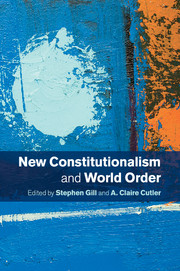Book contents
- Frontmatter
- Contents
- List of Figures
- List of Contributors
- Acknowledgements
- List of Acronyms
- 1 New constitutionalism and world order
- Part I Concepts
- Part II Genealogy, origins and world order
- Part III Multilevel governance and neo-liberalization
- 7 When the global inhabits the national
- 8 New constitutionalism and variegated neo-liberalization
- 9 New constitutionalism and multilevel governance
- Part IV Trade, investment and taxation
- Part V Social reproduction, welfare and ecology
- Part VI Globalization from below and prospects for a just new constitutionalism
- Glossary
- Appendix
- Bibliography
- Index
8 - New constitutionalism and variegated neo-liberalization
from Part III - Multilevel governance and neo-liberalization
Published online by Cambridge University Press: 05 February 2014
- Frontmatter
- Contents
- List of Figures
- List of Contributors
- Acknowledgements
- List of Acronyms
- 1 New constitutionalism and world order
- Part I Concepts
- Part II Genealogy, origins and world order
- Part III Multilevel governance and neo-liberalization
- 7 When the global inhabits the national
- 8 New constitutionalism and variegated neo-liberalization
- 9 New constitutionalism and multilevel governance
- Part IV Trade, investment and taxation
- Part V Social reproduction, welfare and ecology
- Part VI Globalization from below and prospects for a just new constitutionalism
- Glossary
- Appendix
- Bibliography
- Index
Summary
Sparked by the pioneering interventions of Stephen Gill (1995a, 1998b, 2000, 2003), the literature on the new constitutionalism has provided an illuminating basis for conceptualizing the market-disciplinary regulatory reorganization of world capitalism since the 1980s. This work represents an important contribution to the ongoing debate on neo-liberalism, which has long been a lightning rod for discussions of contemporary capitalism, its regulatory dynamics, its crisis tendencies and its possible futures.
Studies of new constitutionalism have focused primarily on the worldwide legal architectures of market-disciplinary regulation, and have tended to emphasize the geopolitical institutionalization of marketizing, commodifying rules since the 1980s. Whereas the formation of global rule-regimes has been investigated in detail by analysts of new constitutionalism, less attention has been devoted to the role of inter-jurisdictional policy transfer networks and processes of regulatory experimentation at both the national and subnational scales. Building upon the concept of variegated neo-liberalization (Brenner et al. 2010), we argue that systematic attention to each of the latter dimensions of regulatory restructuring can strengthen the methodological apparatus for studies of new constitutionalism: it could provide the basis for analyzing the evolution of neo-liberalization tendencies, and of formations of new constitutionalism itself. Through such an approach, moreover, one can productively explore scenarios for counter-neo-liberalizing forms of regulatory restructuring within contemporary capitalism.
- Type
- Chapter
- Information
- New Constitutionalism and World Order , pp. 126 - 142Publisher: Cambridge University PressPrint publication year: 2014
- 21
- Cited by

